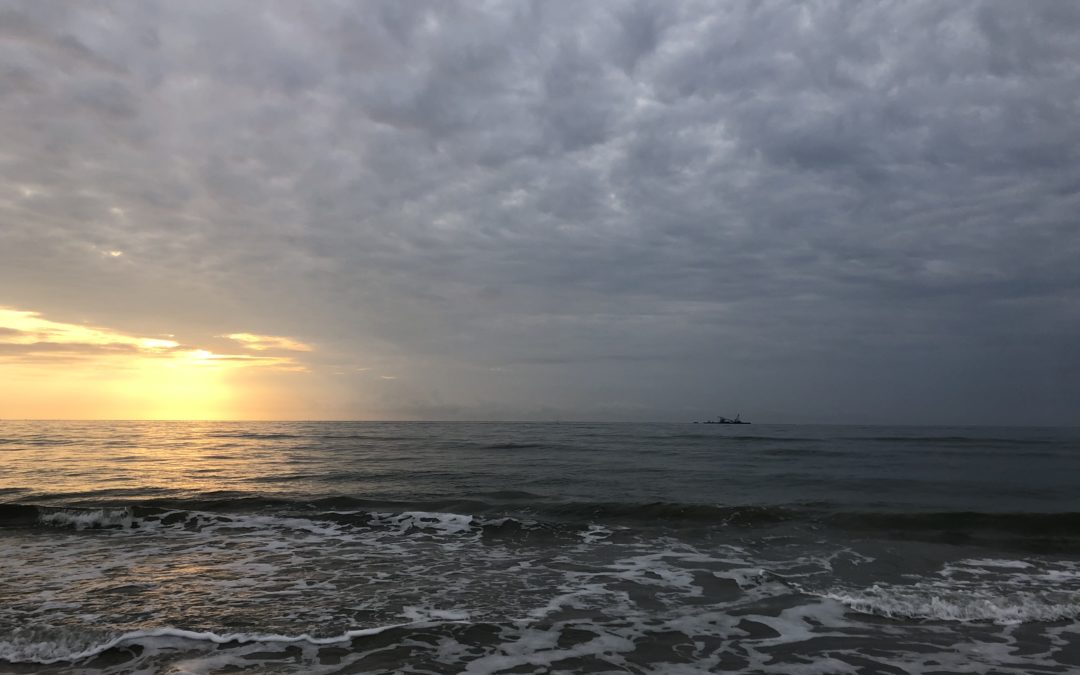CONCERNS RAISED OVER TOXIC COAL ASH SPILL
Pollution Problem Extends Beyond Barge
JACKSONVILLE, FL – St. Johns RIVERKEEPER and the Surfrider Foundation’s First Coast Chapter have serious concerns about the potential environmental harm caused by coal ash from a stranded barge that has spilled into the ocean off the coast of Atlantic Beach in Florida.
In March, a barge carrying coal ash from Puerto Rico crashed into the jetties near the mouth of the St. Johns River, resulting in at least 9,300 tons of coal ash spilling into the surrounding waters. To date, state agencies have been unsuccessful in removing the barge and its contents.
The barge accident also highlights a much bigger problem related to the production and management of toxic waste and who ultimately bears the risks associated with its disposal.
Coal ash is a waste product from the burning of coal in coal-fired power plants that contains toxic contaminants like mercury, cadmium, lead, selenium and arsenic. If not properly managed, coal ash can pollute waterways and drinking water and endanger wildlife and human health.
In 2017 and 2020, the Puerto Rico legislature passed laws banning the disposal of coal ash in its landfills and the on-site storage of ash for more than six months. As a result, the power company AES now ships its coal ash on barges into the port at Jacksonville, before the toxic waste is transported to a landfill in Folkston, Georgia.
“While we don’t anticipate significant impacts to water quality within the St. Johns River from the spill, we do have concerns about ash contaminants entering the aquatic food chain, including fish that use the river,” explained Lisa Rinaman, the St. Johns Riverkeeper. “Studies have documented high levels of chemicals, such as selenium, in the tissues of fish where coal ash has been discharged into waterways. In addition, as the ash sinks to the bottom, it smothers aquatic organisms and plants essential to the health of the ecosystem. It’s all connected.”
There are also significant concerns regarding impacts to the ocean and coastal recreation in the vicinity of the spill. The barge accident happened just off the coast of Hanna Park, home to one of Jacksonville’s most popular surf spots, “The Poles.” The First Coast Chapter of the Surfrider Foundation is concerned about how the spill could negatively impact the health and safety of its members and all those who regularly surf and recreate near the accident site. Surfrider is continuing to call on local, state and federal entities to step in and protect public health by testing the impacted water, alert the public to the pollution and health risks, and take enforcement action against the responsible parties.
“Despite our repeated calls to officials the last few months, testing information and transparency of the situation have been hard to come by,” says Surfrider’s First Coast Chapter Chair Nicole de Venoge. “We were told in May that the barge would be moved within the week and it’s still here in Mid-June. Surfers and swimmers are unknowingly recreating in untested waters after a known spill. Why would we as a city and state be responsible for and accepting of waste so dangerous that it’s protested and prohibited by other jurisdictions? And why would transport of dangerous coal ash be allowed during hurricane season? The polluters must be held accountable, and the public deserves testing and notification so that they understand the risk of recreating in this water.”
This spill in the Atlantic Ocean also highlights a much bigger problem associated with coal ash and toxic waste. When the citizens of Haiti decided they did not want to be exposed to coal ash, the utility decided to simply export its waste to other communities, instead of seeking more sustainable renewable sources of energy production and waste management.
This problem is certainly not exclusive to the burning of coal and its ash by-products, either.
Due to legislation restricting the land application of biosolids in South Florida, wastewater treatment facilities now truck toxic sewage sludge north to the St. Johns River watershed where it is disposed of on farms and ranch lands. Runoff from the sewage sludge containing phosphorus and toxic chemicals is now polluting the St. Johns River watershed and triggering algae blooms.
“Pollution doesn’t just go away when it leaves the property of a coal-fired power plant or a wastewater treatment facility. It becomes someone else’s problem,” Rinaman exclaims. “Polluters must be required to take responsibility for their own waste. They can’t be allowed to put other communities at risk with their pollution, especially those who had nothing to do with producing it.”
###
About St. Johns RIVERKEEPER | St. Johns RIVERKEEPER, Inc. is a member-supported, nonprofit advocacy organization or the St. Johns River and its watershed. Our mission is to defend the St. Johns River and advocate for its protection. Visit www.stjohnsriverkeeper.org for more information.
About the Surfrider Foundation | The Surfrider Foundation is a nonprofit grassroots organization dedicated to the protection and enjoyment of our world’s ocean, waves and beaches, for all people, through a powerful activist network. Founded in 1984 by a handful of visionary surfers in Malibu, California, the Surfrider Foundation now maintains over one million supporters, activists and members, with more than 170 volunteer-led chapters and student clubs in the U.S., and more than 700 victories protecting our coasts. Learn more at www.surfrider.org.
